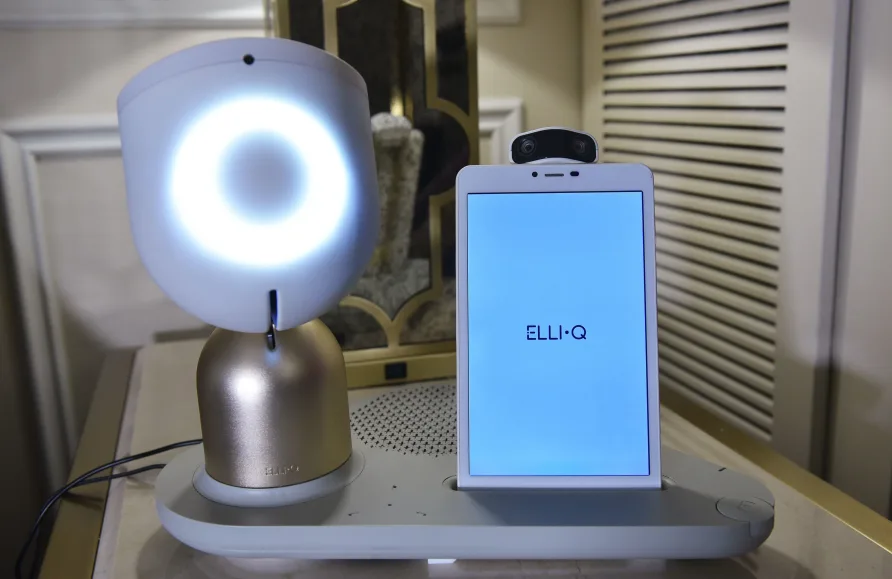As Covid outbreaks continue to impact aged care homes across the country, using robots to help keep isolated residents company could be an attractive solution.
Researchers from the University of Melbourne spoke with 16 older people living in the community to see if robotic companions could help stave off loneliness.
Their study came in response to an American-designed companion robot 'ElliQ', created to battle loneliness and promote ageing in place.
While the latest Covid wave peaked at the end of July, there are still 952 active outbreaks in residential homes, meaning that large numbers of residents are still facing isolation.
ElliQ, a voice-operated intelligent robot, is designed to assist older people in their daily activities, foster empathy and build meaningful connections with its user.
Yet the Melbourne survey found that, while some respondents embraced ElliQ, others voiced significant concerns.
"Some people find robots challenging to use, not in the sense of difficult to operate, but accepting a device that can be intrusive in your life," Associate Professor Jenny Waycott explained.
"For example, some interviewees said the way ElliQ 'piped up' and made suggestions for activities or video calls to family was rude, intrusive and controlling.
"They also said its voice and manner was quite offensive, and they didn't like to be told what to do."
The group worried about how companion robots might negatively impact their abilities, skills and sense of autonomy.
Others said they feared it would take control of their lives and emphasised their need to maintain their dignity.

"Some people are genuinely worried that something bad could happen in the future with robots," Waycott said.
"Others were anxious robot companions might deceive people that they are conscious beings, not merely machines.
"So, it really depends on whether somebody is inclined to believe that they're talking to a person rather than a machine."
The study highlighted that while companion robots may intend to support older people's independence, the way they offer help might have the opposite effect.
One interviewee said, "I'd rather not rely on a machine when I can think for myself".
"It will shrink our brains," another warned.
Driven by concerns about ageing populations, caregiver shortages, and social isolation and loneliness, research into companion robots continues to pile up.
Most studies suggest that human-robot interaction may benefit older people by improving health and providing assistance and entertainment.
One in five older Australians are socially isolated which worsened during the pandemic – close to 40 per cent of older people reported they struggled to stay connected over recent years.
To hold off depression and loneliness, pet companion robots such as Paro and Biscuit are used in residential care homes to boost social interaction.
But even with robotic pet companions, Waycott said, "we're still away from this lifelike feeling as if you're talking to a human or interacting with a real animal".
"At the moment, it's all still relatively robotic," she said.
"But the interesting thing about ElliQ is there's no attempt to make this a humanoid robot, so it doesn't look like a person."
With an appearance resembling "a lamp that glows when it's talking", ElliQ can move around and turn towards a person when talking.
"There's still that sense of inauthenticity, certainly in how the voice works," Waycott said.
"It's much the same as when talking to a chatbot on a help desk. You can usually tell that you're talking to a chatbot."
The AI-enabled robot learns about its users' interests through conversations and adapts over time.
Designed to be the first proactive and empathetic device, the company estimated that ElliQ initiates 20 interactions with its user daily.
They emphasised that the robot can show empathy and can become a true care companion.
But Waycott pointed out that it's not necessarily a genuine experience of empathy, but instead "just a well-trained AI".
"You want it to be a device that adapts and is very personalised to the person because people each have very individual interests and needs," she said.
"But it can also become frustrating when the AI conversation, trained on the previously experienced algorithm, just doesn't get us quite right."
Although ElliQ is specifically designed to interact with older people, the generations' level of exposure to technology may influence their acceptance of companion robots.
Many older people were already in their middle age when the internet and its connected devices started to gain momentum.
Today, just below half of older Australians moderately understand digital technology.
But according to Waycott, it's unfair to characterise all older people as resistant to using new technologies.
"We need to ensure technologies are designed carefully with older people in mind," she said.
"For some, it's just not something they want to consider, and I think we have to be respectful of people's preferences.
"Not everybody wants to use technology for communication, and indeed some people will find it quite challenging – particularly the idea that the technology might be used instead of human communication."
She highlighted that we must always augment technology rather than use it to replace human companionship.
While future generations entering aged care might have had a lifetime of experience with technology, Waycott said that it could also mean they'll be more critical of robotic companionship.
By that time, socially engaging technology might look very different from what it does today.
"The newer generation might be more open to the idea, but also more critical," she said.
"They may be very aware of what they want from technology and what they don't want, and understand the benefits, challenges and risks it entails."
Waycott estimated that future development and implementation of robot companions will heavily rely on people's acceptance of them.
"It depends on whether they're characterised as tools rather than alternatives to what we already have.
"So tools that provide support, instead of human companion replacement or a pet companion replacement."
She said the most significant barrier is people's concern that robots might replace human companionship or human care.
"I think ElliQ is a good example of something that doesn't try to be a humanoid robot that might frighten people.
"It's clear that it's a device and builds on this idea of a voice assistant providing support.
"So I think that when something has been designed well and does interesting things in new ways, some older people can certainly be interested in using the technology and be interested in learning about it."
Do you have an idea for a story?Email [email protected]
 Aged Care Insite Australia's number one aged care news source
Aged Care Insite Australia's number one aged care news source


One comment
Pingback: [Intuition Robotics in Aged Care Insight] Could robots help with Covid-19 isolation? |